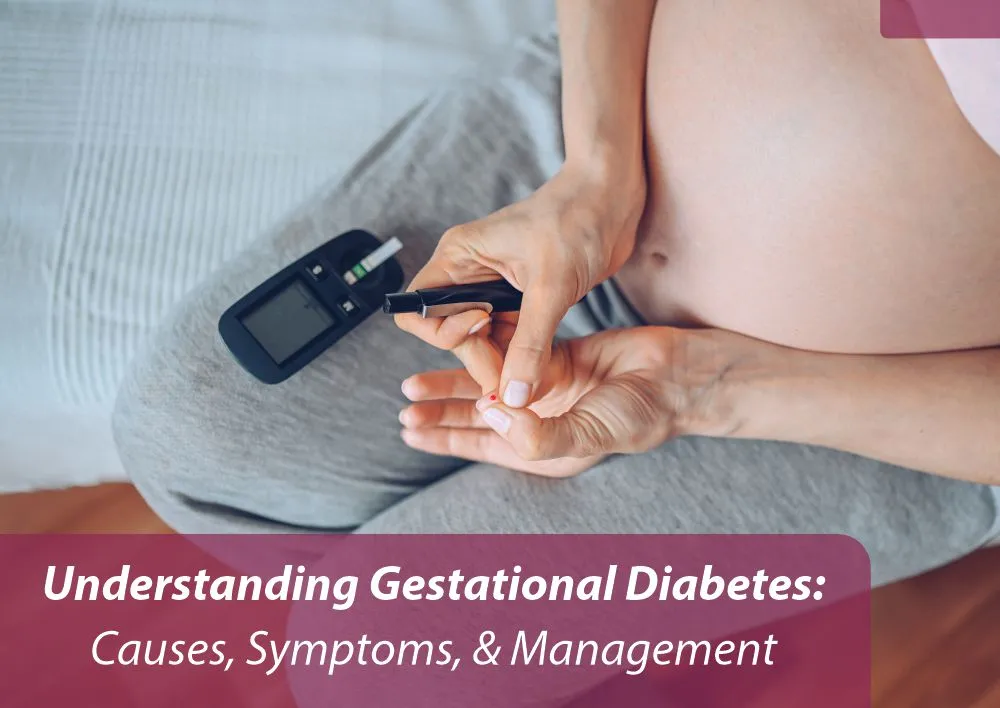Gestational Diabetes: Symptoms, Causes, Diagnosis & Treatments
Gestational diabetes (GD) also known as gestational diabetes mellitus, is a type of diabetes. It can develop at any time during pregnancy but typically occurs during the second or third trimester. Diabetes Mellitus in Pregnancy occurs when the body is not able to produce enough insulin to meet the increased need during pregnancy. Insulin is a hormone that helps the body use glucose for energy but when the body can’t make enough insulin, glucose builds up in the blood.
In this blog post, we will explore gestational diabetes, its symptoms, causes, diagnosis, and treatment to manage it.
Gestational Diabetes Symptoms
Many females with gestational diabetes have no symptoms or the symptoms may be mild or go unnoticed. But some females may have the following symptoms:
-
Increased thirst
-
Frequent urination
-
Extreme hunger
-
Fatigue
-
Blurred vision
-
Slow-healing sores
If you are experiencing all or any of the mentioned signs of gestational diabetes, it is important to talk to the best gynecologist near you for the treatment of gestational diabetes at an early stage.
Gestational Diabetes Causes
The exact cause of gestational diabetes is not known, but it may be related to the changes in the hormones during pregnancy. The placenta during pregnancy produces hormones that can make the cells of the body less sensitive to insulin. This is known as insulin resistance.
Insulin is a hormone that helps the body use glucose for energy. When the cells of the body become insulin resistant, glucose builds up in the blood and leads to gestational diabetes.
Some other causes of gestational diabetes include:
-
Obesity or being overweight before pregnancy
-
A family history of diabetes
-
Age over 35
-
History of gestational diabetes in a previous pregnancy
Gestational Diabetes Diagnostic Tests
The screening for gestational diabetes is done between 24 and 28 weeks of pregnancy. There are two types of gestational diabetes tests including:
-
Glucose challenge test: The Glucose Challenge Test (GCT) is a screening test that is typically done between 24 and 28 weeks of pregnancy. To perform this test, the doctor will ask you to drink a sugary drink and then after an hour, your blood sugar level will be checked. If your level of blood sugar is high on the glucose challenge test, then you will need to take a glucose tolerance test.
-
Glucose tolerance test: The Glucose tolerance test (GTT) is longer and more involved than the glucose challenge test. You will drink sugary drinks in large quantities and then have your blood sugar level checked several times over the next three hours.
If two or more of your blood sugar levels are high on the glucose tolerance test, you will be diagnosed with gestational diabetes. Your doctor will work with you to develop a treatment plan that is right for you and your baby.
Gestational diabetes risk factors
Anyone can develop gestational diabetes during pregnancy but some factors increase the chance of developing gestational diabetes mellitus in pregnancy.
Some risk factors for gestational diabetes include:
-
Being overweight or obese before pregnancy: The more obese you are, the higher your risk of developing gestational diabetes.
-
Family history of diabetes: If you have a parent with diabetes, you are more likely to develop gestational diabetes yourself.
-
Being over the age of 35: As you get older, your risk of developing gestational diabetes increases.
-
Having had gestational diabetes in a previous pregnancy: If you have had gestational diabetes in the previous pregnancy, you are more likely to develop it again in the future.
-
Having Polycystic ovary syndrome (PCOS): PCOS is a hormonal disorder that can affect fertility and metabolism. Females with PCOS are at an increased risk of developing gestational diabetes.
-
Being of certain racial or ethnic groups: Females of African American, Hispanic, American Indian, and Asian American descent are at an increased risk of developing gestational diabetes.
Gestational Diabetes Treatments
The primary goal of gestational diabetes treatments is to keep blood sugar levels within a healthy range to maintain the health of both the mother and the baby. If gestational diabetes is left untreated, it can lead to various complications for you and your developing baby.
The Treatment for gestational diabetes typically includes:
-
Diet: Eating a healthy diet is crucial for treating gestational diabetes. It means eating a regular meal that includes plenty of fruits, vegetables, and whole grains. It is also important to limit processed foods and sugary drinks.
-
Regular Exercise: Regular exercise for at least 30 minutes of moderate-intensity helps the body use insulin more effectively.
-
Medication: If diet and exercise are not enough to control your blood sugar levels, your doctor will recommend medications that are safe to use during pregnancy to manage the level of your blood sugar.
-
Blood sugar monitoring: Regular blood sugar monitoring will help you track your blood sugar levels and make sure that your treatment plan is working.
Impact of Gestational Diabetes on Mother and Baby
Gestational Diabetes can have several implications for both the mother and the developing baby if left untreated or poorly treated.
The impact of Gestational Diabetes includes:
-
For the Mother:
-
Preeclampsia and other complications
-
Higher chance of the need for a C-section
-
More likely to develop Type 2 Diabetes
-
For the Baby:
-
Macrosomia
-
Hypoglycemia
-
Excessive Birth Weight
-
Early Birth
-
Stillbirth
-
Respiratory Distress Syndrome
-
Risk of Obesity and Diabetes
Conclusion:
Gestational diabetes(GDM) is a treatable condition. It can be managed with proper care including taking timely treatment, monitoring blood sugar levels, and maintaining a healthy lifestyle. By following healthy habits, you may manage gestational diabetes successfully and give birth to a healthy baby.
To manage/treat Diabetes Mellitus in Pregnancy, it is important to consult your doctor and be proactive in managing. Always remember, with healthy habits and proper treatment, you can get rid of gestational diabetes during pregnancy, enjoy a healthy pregnancy, and give birth to a healthy baby.
Miracles Apollo Cradle is the best gynecologist hospital in Gurgaon. We have a team of experienced gynecologist doctors in Gurgaon backed by advanced infrastructure and facilities. Our gynaecology doctors have expertise in handling all kinds of gynecological conditions including gestational diabetes, complex deliveries, and other surgeries including a range of laparoscopic surgeries.
We have advanced facilities and equipment for treating gestational diabetes including a state-of-the-art neonatal intensive care unit (NICU) in case your baby needs specialized care.
Our experts evaluate the condition of the patients and provide highly effective comprehensive care for gestational diabetes including diet and exercise counseling, blood sugar monitoring, and medications.
If you are pregnant and have been diagnosed with gestational diabetes mellitus, Miracles Apollo Cradle is a good choice for your treatment.
FAQs
What is the healthy range of Gestational diabetes?
The healthy range of Gestational diabetes is:
-
Fasting blood glucose level is lower than 95 mg/dL (5.3 mmol/L).
-
1 hour after drinking the sugary drink, a normal blood glucose level is lower than 180 mg/dL
-
2 hours after drinking the sugary drink, a normal blood glucose level is lower than 155 mg/dL
-
3 hours after drinking the sugary drink, a normal blood glucose level is lower than 140 mg/dL
What can I do to make living with gestational diabetes easier?
Living with gestational diabetes is challenging. But by following some tips on how to make living with gestational diabetes easier, you can make it easy.
Here are some tips:
-
Eat a healthy diet
-
Exercise regularly for at least 30 minutes
-
Test your blood sugar levels regularly
-
Talk with your doctor for medications if required for diabetes management.







_in_Pregnancy.webp)





Was the information useful?
0 0